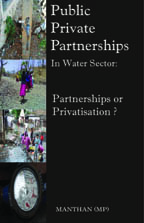/topics/government-programmes
Government Programmes
Negotiating participatory irrigation management (PIM) - A research study from the Indian Himalayas
Posted on 05 Feb, 2010 04:15 PMThis research paper published in the Journal of Agricultural Water Management draws on a case study from a village in the Shiwalik region of the Indian Himalayas and identifies the role of diverse actors in exploiting historic and ecological factors to derail the Participatory Irrigation management (PIM) reforms to frame water management problems. The paper explores the inter-linkages between socio-cultural, institutional and ecological factors in derailing the PIM reforms. Participatory irrigation management (PIM) reforms are implemented in India to facilitate farmers’ participation in irrigation management, through water user groups.
Book : "Public-Private Partnerships in Water Sector: Partnerships or Privatisation?"
Posted on 01 Feb, 2010 05:17 PMAbout the Book –

Public-Private Partnerships (PPPs) are supposed to provide solutions to many of the existing problems related to infrastructure projects – in both execution and operation. Currently, there are PPP projects in almost all the sectors including roads, ports, airports, water, sewerage, solid waste management and transport among others. It is, therefore, important to do a reality check on PPP projects and their efficacy in addressing the problems faced by the public sector water supply services and other infrastructure sectors as well.
The report looks at various aspects of PPPs, beginning from why PPPs have come to be regarded as the major approach for infrastructure development in the country, the circumstances that lead to the change in approach from direct privatisation to public-private partnerships, the current status of the PPP projects that are being executed in India, especially in the water sector, to the current estimates and projections of investment requirements for infrastructure development in India by governments and International Financial Institutions (IFIs).
A mid-term assessment - Sachetana drinking water plus project - Fluorosis Mitigation - BIRD-K - Mundargi taluk - Gadag district (Karnataka)
Posted on 29 Jan, 2010 06:02 PMThe Sachetana Drinking Water Plus project implemented by the BAIF Institute of Rural Development (BIRD-K), in three districts of Karnataka, aims to solve the problem of endemic fluorosis in the region, by providing an alternate source of water and by improving the quality of groundwater.
This report is a mid-term assessment of the project in Mundargi taluk of Gadag district of Karnataka, undertaken to understand and document the decentralized fluoride mitigation strategy adopted in the project villages and to analyze the impact on the groundwater levels and water quality as a result of the project's efforts.
Monthly magazine-Dams, Rivers & People, Sep-Oct 2009, Oct-Nov 2009, Dec 2009 - Jan 2010
Posted on 25 Jan, 2010 12:56 PM
Water law, Poverty, and Development - Water Sector reforms in India: A book by Phillepe Cullet
Posted on 24 Jan, 2010 02:58 PMWater law for the 21st century - National and International aspects of water law reform in India: A book analyzing legal issues under international law
Posted on 24 Jan, 2010 02:13 PMIn the face of growing freshwater scarcity, most countries of the world are taking steps to conserve their water and foster its sustainable use. Water crises range from concerns of drinking water availability and/or quality, the degradation or contamination of freshwater, and the allocation of water to different users. To meet the challenge, many countries are undergoing systemic changes to the use of freshwater and the provision of water services, thereby leading to greater commercialization of the resource as well as a restructuring of the legal, regulatory, technical and institutional frameworks for water. Workshop on pollution abatement in Ganga basin - Need for effective waste water managementPosted on 28 Dec, 2009 05:08 PMKanpur, November 24, 2009: Shri Alok Ranjan, IAS, Principal Secretary, UP Urban Development and Environment, inaugurated the workshop organized by WWF India, Kanpur Nagar Nigam and IIT Kanpur. Right to water and sanitation : Water Drops, the Water Aid newsletterPosted on 16 Dec, 2009 03:21 PMThe newsletter explores the ways in which national laws, court pronouncements and judgements and international commitments can be interpreted to imply a right to water and sanitation. Specific articles cover: -Individual court cases and Supreme Court pronouncements Letter from Rajendra Singh to Jairam Ramesh to withdraw environmental clearance to Athirappilly projectPosted on 14 Dec, 2009 10:27 AMPlease see the letter addressed to Jairam Ramesh by Rajendra SInghji on Athirappilly Issue when he visited the river and the dam site on the 8th December. To read the letter Click Here. Pagination |





